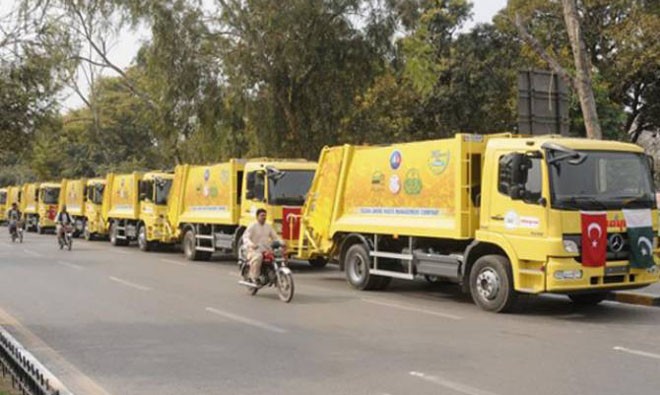
Two years since the waste management system was handed over to foreign companies, the domestic consumers complain of lack of a proper service

On March 2010, the City District Government Lahore (CDGL) set up the Lahore Waste Management Company (LWMC) under section 42 of the Companies Ordinance 1984. The aim was to make Lahore a cleaner city. For the purpose, some areas with dense population, low income and high waste production rates were chosen as model projects. These included Union Council No. 28 of Ravi Town, Union Council No. 71 of Data Ganj Baksh Town and Union Council No. 89 of Samnabad Town. The service was provided at people’s doorstep with fair success, in collaboration with the private sector.
"We wanted to sensitise the general public about cleanliness and waste management," says Asad Ahmad, a spokesman of LWMC. "A local company named Waste Busters was assigned the task of door-to-door collection of waste. We had smart-looking workers who would go out into the residential areas everyday, between 9am and 2pm, and collect the garbage bags [that had been provided to the people by the government beforehand]."
Satisfied with the progress of the model projects but feeling the need to introduce institutional and managerial reforms in order to improve the urban waste management system as per international standards, the LWMC set out to expand its scope of work to 136 union councils of Lahore. The areas were functionally divided into Zone 1 and Zone II, with Ferozpur Rd as "Durand Line".
The task was assigned to two Turkish companies -- M/s Al-Bayark and M/s Ozpak -- on November 3, 2011, the contract duration being seven years. The total value of the contract was US $320 million. The companies took charge in different phases.
The locals were hoping for improvement. Things started well, only to come to an abrupt halt.
"We were happy with the arrangement as I read the banner displayed by the waste management company in which the public had been asked to use the facility provided by the LWMC and not to entertain the scavengers for disposal of their domestic waste," says Faheem Chaudhary, a middle-aged resident of Faisal Town, Union Council 127.
"We were also given garbage bags. It was a value added service. But after sometime we were awakened out of our wishful dream and the service was stopped. We were back to the days when random waste collectors would come, slogging on a donkey cart, to collect the refuse."
However, Chaudhary says, the waste collector charges only Rs200 per month per house, which "isn’t a bad deal."
For his part, Asif Iqbal, Manager Planning, LWMC, says the "companies are working as per plan. They were supposed to provide garbage bags to houses for a set period of time. The people should realise their responsibility as a civilised nation and continue with the good practice on their own."
The waste collectors pick garbage heaps only if they find them outside the houses or lying in the containers installed by the said companies at different points in a locality. "The mini dumpers can reach out to even narrow streets in order to collect waste," Iqbal adds.
The case is not much different for the inhabitants of Union Council 41, Harbanaspura. For 50-year-old Babar Ahmad, who works in a government organisation, "I’ve never come across an LWMC worker collecting waste from our streets. Sure I can see a growing number of containers installed in our area."
Ahmad is of the view that paying a hundred rupees or so per month to the person who collects waste from your doorstep is easier than having to carry a bag loaded with garbage as heavy as 10kg to the waste container a few hundred metres away.
Ashraf Masih, a waste collector who has been providing the service in J-Block, Johar Town, for the past almost ten years, believes that the induction of waste mangement companies in the system has not affected his job as people of the area still rely on him better.
The situation demands some serious consideration. The scavengers are exploiting the benefits of a mega project that is taking a huge amount of tax and has the tendency to change the cleaning culture of the city. But even after two years since the system was set up, the waste management companies are not able to give satisfactory services to the domestic consumers.
The basic element of cleaning the city -- i.e. door-to-door collection of waste -- is being looked over. The government has tested the expertise of local vendors for the particular objective and proper disposal of domestic waste. Their skills and experience should be utilised and they should be inducted into the system for proper and better domestic waste management.